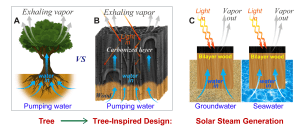Water is a resource that humans cannot live without. It is considered one of the major global challenges faced by our world. Current desalination techniques have limitations, including salt accumulation, and extracting water from ground sources has been less studied.

Schematic demonstrating the working principle of bilayer wood. More information here.
A team of researchers, from the University of Maryland and the University of Wisconsin-Madison, have designed a solar steam device for the extraction of potable water from seawater and groundwater sources.
The solar steam device is composed of natural wood whereby carbonization of top portion creates a bilayer device. The natural wood portion facilitates water transport through the wood layers, while the carbonized layer acts as a light absorption layer.
Advantages of this bilayer wood for steam generation, includes light and thermal management, and fluidic transportation. The wood demonstrates light trapping, absorption, and thermal isolation capabilities. Infrared imaging results show that the bottom layer demonstrates efficient thermal isolation.
Furthermore, the natural wood bottom layer provides rapid water transport when inserted into salt or ground water. This bilayer wood device is inexpensive, scalable, and addresses challenges in extracting potable water from ground water or salt water sources.

















